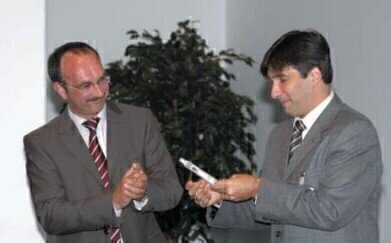News & Views
Research on Olfactory Receptors wins Neurobiology Prize
Feb 05 2010
All animals derive essential information from a wealth of different odour signals in their environment. Insects have particularly sophisticated “noses” that allow detection of food, warn of danger and play an important role in many social interactions such as courtship behaviour. Dr Richard Benton, Assistant Professor at the Center for Integrative Genomics, University of Lausanne, Switzerland has won the Eppendorf & Science Prize for Neurobiology 2009 for his research on how insects sense volatile chemical signals.
Dr Benton’s studies have focused on the olfactory receptors of the fruit fly Drosophila melanogaster. His work has revealed unexpected evolutionary parallels between insect chemosensation, immune recognition and synaptic transmission. Dr Benton has shown that insects have invented unusual molecular mechanisms to detect smells, “borrowing” molecules that, in other animals, allow neurons to communicate with each
other or act in the immune system to detect bacteria. Dr Benton writes, “Our discoveries demonstrate that animal nervous systems can evolve very different solutions to the same problem of sensory detection. By targeting these unusual molecular mechanisms with specific chemical inhibitors, it may be possible to control the odour-evoked behaviours of insects that transmit human diseases such as malaria.”
Dr Axel Jahns at Eppendorf headquarters in Hamburg, said: “Sponsored jointly by Eppendorf and the journal Science, this international US$25,000 prize is open to scientists of 35 years of age or younger who have made outstanding contributions to neurobiological research using molecular and cell biology methods. Dr Richard Benton was selected as the winner of the Eppendorf & Science Prize 2009 by a committee of distinguished
scientists chaired by Dr Peter Stern, Senior Editor of Science. The presentation took place in Chicago, USA on October 19, 2009 at a gala dinner for over 80 guests from the scientific community.”
The 2008 prize-winner Dr Mauro Costa-Mattioli from the Department of Neuroscience at Baylor College of Medicine, Texas, USA visited Eppendorf headquarters in Hamburg recently, where he gave a talk on his ground-breaking work on the importance of translational control in the formation of longlasting memories which could help in development of treatments for major brain disorders.
The next deadline for applications for the Eppendorf & Science Prize for Neurobiology is June 15, 2010. For more information about Dr Benton and the Prize, visit www.eppendorf.com/prize.
Digital Edition
Lab Asia 31.2 April 2024
April 2024
In This Edition Chromatography Articles - Approaches to troubleshooting an SPE method for the analysis of oligonucleotides (pt i) - High-precision liquid flow processes demand full fluidic c...
View all digital editions
Events
Apr 22 2024 Marrakech, Morroco
Making Pharmaceuticals Exhibition & Conference
Apr 23 2024 Coventry, UK
Apr 23 2024 Kintex, South Korea
Apr 23 2024 Seoul, South Korea
Apr 24 2024 Jakarta, Indonesia









.jpg)









